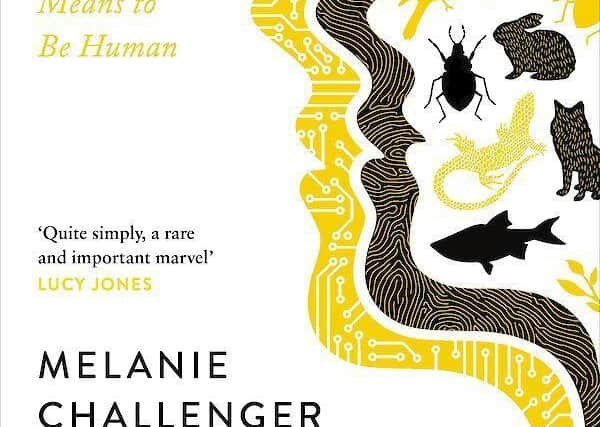Book review: How to be Animal, by Melanie Challenger


This is a provocative, incisive and worried book, carried off with no small degree of élan. It is multi-disciplinary, taking in ecology, philosophy, law, futurology, psychology, palaeontology and anthropology. Its basic argument against “human exceptionalism” can be broadly sketched as covering three areas. All stem from one contention: that humans have, in some rather unexplained fashion and by unfathomable processes, decided that we are disconnected or apart from the natural world. The consequences of this “othering” of the natural and the dislocated nature of the human – between the beasts and the angels, if one wants to phrase it theologically – is that our relationship with other living things on the planet is out of kilter and destructive; that it has a perceptible diminution in the physical and mental well being of humans; and that in our quest to distance ourselves yet further from the natural we may be unleashing horrors as yet unforeseen or imaginable. The question is, technically, for such a book: with so many targets, has the author enough arrows in her quiver?
Humans are animals. This seems to me, at least, to be self-evident. Yes, there have been thinkers who wanted a strict demarcation between the human and the living but not-human, and Challenger goes into their reasoning and its evasions in detail. But this has always been a vexed field of enquiry. To say “humans are animals” is not the same as to say “humans are just animals.” It is flippant to talk about no squids having written epic poetry, but there is a problem about how great a divide makes a meaningful difference. A cat will cover its business in the litter tray. I go to the toilet. To what extent do the similarities of these outweigh the tangible differences? Cats don’t require integrated plumbing systems, separate rooms, locking doors, the cultivation of crops to make paper, the mechanisation to make it into loo rolls, or an economy whereby writing a review allows for the purchase of said paper, as the polymath Raymond Tallis has wryly noted. Where is the spectrum and where is the break?
Advertisement
Hide AdOne of the very best parts of this book is the manner in which Challenger conflates intellectual activities that can seem opposed. “The soul” is religious shorthand for the ineluctable haeccitas of the human. Post-religious Enlightenment thinkers often shunt the soul into the idea of a self-conscious thinking agent, a person, or a nebulous intelligent consciousness. All these ideas, as Challenger demonstrates, have a tendency to fray. Should people with profound cerebral damage be denied personhood? Should corporations be allowed legal personhood? Does Balaam’s Ass get an honorary soul? If being rational is a sign of being human, ought I to forgo my humanity since I know rationally that smoking is bad for me, but do it nonetheless?


A lot of the book’s prime concern is in unpicking where the idea of hierarchy originated. Earlier histories depicted humans as inevitable (we’re not) and the apex (we might not be, and who defines this anyway? We are markedly poor at seeing ultra-violet light). For the most part, Challenger avoids any sentimental or prelapsarian view of the “animal.” Nature may not be just red in tooth and claw, but it is certainly acquainted with violence. Questions around sentience of other living things is an equally problematic area. Do we think that the dog is dreaming or do we impose our idea of dreaming on the dog? Could we ever even know: Thomas Nagel posed the question “What is it like to be a bat?” – let alone a multicellular fungus colony. The insolubility of the problem may not be permanent – make no bets on the future – but at present speculating about what an animal thinks or experiences is a bit like trying to imagine what colour a four sided triangle is, tempting though that is. Moreover, we don’t really know what other humans think – is the pain I feel the same as the pain you feel? – so a leap into an orca is a tall order.
Our separation from our intrinsic animal nature is not just regrettable but dangerous. Challenger shows, elegantly, how having a category of “non-human” allows animals to be metaphors for disgust, the abject, the untrustworthy, the dangerous. Perhaps once too often recently even liberals have said “they’re just animals.” It becomes more pressing when she deals with the idea of transcending the body completely, either by uploading into a cloud as nebulous as consciousness itself, or cybernetic upgrading of the body. (Do read David Bunch’s Moderan stories: if you think the Borg or the Cybermen are horrific, his Moderan machine humans are the most, ironically, visceral). She writes very well indeed on the subtext behind our gleaming future being often a front for deeper and more disturbing issues, such as the phasing out of motherhood, a canker of misogyny in these bright, shiny futures.
There are plenty of books I could recommend on each one of Challenger’s topics, but this book skilfully braids all of them. There are some parts that irked – the old “we are all stardust”, which is true, as is “we are all waste from a nuclear explosion,” a faintly misty plea for appreciating the richness around us – but overall this is an excellent primer to the problems we have caused and that we face.
How To Be Animal, by Melanie Challenger, Canongate, £18.99
A message from the Editor:
Thank you for reading this article. We're more reliant on your support than ever as the shift in consumer habits brought about by coronavirus impacts our advertisers.
If you haven't already, please consider supporting our trusted, fact-checked journalism by taking out a digital subscription at https://www.scotsman.com/subscriptions